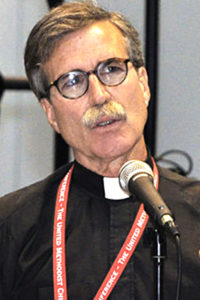The Church’s Countercultural Mary
Women in leadership roles are to some degree immune from public criticism. Often, those who find female leaders lacking tend to restrict their observations to private communication. Afraid of being labeled “sexist,” they pretty much silence their concerns.
Sure, there are some who have been publicly critical of women in leadership roles. But they often reside in the “fever swamps” of public life and at the fringes of popular culture. Lacking widespread “cred,” their opinions are noticed by few, persuade even fewer, and make little or no difference in public life.
Relatively untouched by criticism, women leaders have grown in confidence. They have become decisive and comfortable in their own opinions and positions. Their self-confidence begins with their understanding of what comprises an ideal woman. Generally speaking, American women in leadership today understand the ideal woman to be as they themselves are—that is, confident, independent, strong, and self-assertive.
That ideal woman—again, confident, independent, strong, and self-assertive—can be found throughout American life today. Think about it. Little girls are told, “You can do anything you want to do, be anything you want to be.” Female students are encouraged to study hard, excel to an extraordinary degree, seek and land top jobs. Women in the workplace are shown the glass ceiling and challenged to break it—the sooner, the better. Plenty of confidence, independence, strength, and self-assertion are required to achieve these things.
Not so incidentally, these same characteristics are associated with the decision to terminate an inconvenient pregnancy, as it is commonly believed that abortion is necessary to allow a woman to pursue her career goals.
December’s Mary
Every December (roughly, during the Season of Advent), the churches (Catholic, Orthodox, evangelical, and mainline Protestant) present an indirect and subtle challenge to today’s notion of the ideal woman. This is done by reading lectionary (or assigned) passages from the Bible about Mary, the Mother of our Lord. The most famous of these features the angel Gabriel announcing to Mary that she will conceive and give birth to Jesus. Not surprisingly, Mary is at first perplexed. But then comes her beautiful and powerful reply: “Behold, I am the handmaid of the Lord; let it be to me according to your word.” (Luke 1:38, RSV)
Mary’s words provide the Christian disciple and the Christian Church with the perfect example of what it means to have faith in God, to submit to His Word, His will, His plan. Mary is not in control. She is not thinking about herself, or her future, or blazing her own trail. Instead, Mary simply listens to the angel and then chooses to trust and obey God—a sharp contrast to the confident, independent, strong, and assertive ideal of womanhood today.
In a recent column on the website of First Things (“Woman, and Women, of the Year,” Jan. 1, 2025), Archbishop Emeritus [of Philadelphia] Charles Chaput writes that “in his 1995 Letter to Women, St. John Paul II described Mary as ‘the highest expression of the “feminine genius”’—a genius, he stressed, “shared not only by ‘great and famous women of the past,’ but also by all women, of whatever calling or station, ‘who reveal the gift of their womanhood by placing themselves at the service of others in their everyday lives.’”
Two Ways of Being a Woman?
By identifying herself as a “servant of the Lord,” Mary speaks out of not only her faith but also her “feminine genius,” her womanhood. Women in the Church today have a choice: They can either model themselves on a self-serving contemporary ideal of womanhood, or they can imitate the Mary of the Bible and, through faith, hope, and love, endeavor to serve others. In a strange way, the Mary of the Bible just might be more confident (with God’s lead), more independent of the herd (with God’s encouragement), stronger (with God’s help), and more self-assertive (in service to others) than today’s glass-ceiling-breaker.
Were the Mary of the Bible lifted up by pastors and churches not just in December but throughout the year. . . were Mary the Mother of our Lord heralded as the first example of trusting-and-obeying discipleship . . . were Mary taken to heart and imitated—there would likely be fewer abortions.
_______________________________
Bio accompanying piece:
—Rev. Paul T. Stallsworth, an elder, is a member of the North Carolina Conference of The United Methodist Church. Retired from pastoral ministry, he is the editor of Lifewatch, a quarterly newsletter that proposes the Gospel of Life to Methodists and others. (A version of this reflection will appear in the March 1, 2025, issue of Lifewatch.) With his wife Marsha (who has reflected the faith and life of Mary for decades), he lives in Wilson, NC.











Why should we imitate Mary? She is not part of the Trinity, so why should we want to emulate her? In fact, she becomes less consequential ad the Bible continues, so why should we as women look to her? What. if we prefer to emulate Jesus or God himself?